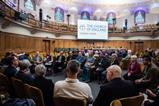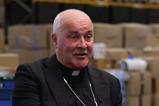Despite what some have suggested, the CofE has not changed its teaching on marriage, says Dr Ian Paul. He explains what has - and hasn’t - happened, and why he’ll keep fighting for church doctrine to remain faithful to Jesus’ teaching

The meeting of General Synod last week has been described as a “watershed moment” by many in the Church of England. Some have even claimed that the Church has changed its doctrine of marriage.
But this is not true.
The Church is established by law, meaning that its regulations, including doctrine, have legal status. They can only be changed by proper process, and its liturgy (the prayers and services it uses) can only be revised with a two-thirds majority in each of the three houses of General Synod (laity, clergy and bishops).
Church doctrine on marriage remains as stated in Canon B30: “a union permanent and lifelong…of one man with one woman, to the exclusion of all others”.
What has happened so far
The Church has been engaged for many years in debate about sexuality and marriage, and there has been a strong movement from within to recognise same-sex marriage. For the last few years, this has taken the form of a process called Living in Love and Faith.
In February 2023, the House of Bishops brought a proposal to the General Synod. But it was very rushed, and looked to many like making small changes which would then be seen as a change in doctrine without ever discussing it. The 2023 proposal was amended to state that the doctrine of the Church would not change, and any prayers introduced must not be “indicative of a change of doctrine”.
Many evangelical and orthodox congregations are growing, even while others are rapidly disappearing
In November 2023, Prayers of Love and Faith were proposed for use within a regular service. These were in theory designed to offer a welcome and affirmation to gay people in a relationship, but (it was claimed) did not affirm the relationship, and so were not indicative of a change of doctrine. Few people found this convincing or satisfactory.
Fast forward to July 2024 and the proposals moved on significantly, not only proposing that the Prayers of Love and Faith be adapted for use in a stand-alone service (i.e. a service focused on celebrating a same-sex relationship or marriage) but a timetable was proposed for consideration of clergy being able to enter same-sex marriages.
In a moment of honesty, Rt Rev Martyn Snow, Bishop of Leicester and lead bishop for the LLF process this year, admitted that the proposed trial of standalone services would in fact be a permanent change, since there was no mechanism to withdraw them. And Rt Rev Sam Corley, Bishop of Stockport, admitted that it would be unsustainable for clergy to bless a same-sex relationship that they themselves could not enter.
Squaring a circle
Legal advice given in 2017 and 2023 said it would be impossible to have a stand-alone service of prayers which did not make clear a) the Church’s doctrine of marriage, b) that the relationship being blessed was not a marriage and c) that the relationship was therefore, in the Church’s sight, sinful. Such a service would not be usable.
In addition, the three issues of doctrine, liturgy and clergy conduct are all tied together. Canon C26 puts it like this: “At all times he [clergy] shall be diligent to frame and fashion his life and that of his family according to the doctrine of Christ, and to make himself and them, as much as in him lies, wholesome examples and patterns to the flock of Christ.”
In a Church that believes that a sexual relationship outside male-female marriage is sin, clergy are not free to enter such relationships. They could only do so if and when the Church changes its doctrine.
The motion brought to Synod this July by Bishop Snow appears to be trying to square a circle - with no suggestions on how this impossible feat could be achieved.
Wider context
This whole debate was put in context by two other papers and presentations. Carl Hughes, director of finance for the Archbishops’ Council, highlighted the dire attendance and finance situation the CofE faces. Attendance has fallen 50 per cent in the last 14 years, and there are as yet no signs of this slowing. Candidates for ordination have dropped by 40 per cent - an important measure of confidence. Giving has dropped by 30 per cent and, at the same time, diocesan annual deficits have doubled to over £60m.
Every denomination which has revised its doctrine of marriage in recent years has both divided and declined. So, the LLF process is likely to compound an already serious situation.
It would be unsustainable for clergy to bless a same-sex relationship that they themselves could not enter
There was also a paper and presentation on trust. It noted that the word in the New Testament usually translated ‘faith’ actually means “to put your trust in” someone. Psychological studies show four key elements needed for building trust. The strategy of the House of Bishops in pushing through change on marriage has broken every single one of them.
For the past two years, the bishops have refused to publish minutes of their discussions, the legal advice they have been given, even summaries of consultations. They have produced their proposals like a rabbit out of a hat - and it has destroyed trust.
The way ahead
The bishops who are pushing through change (and a growing minority oppose this) seem oblivious to the damage they are doing and the division it is causing.
The Alliance, a coalition of networks in the CofE who believe the historic understanding of marriage as between one man and one woman, have now said they will now form a de facto “parallel province” within the Church. And the Church of England Evangelical Council (CEEC) commissioned a group of Alternative Spiritual Overseers to offer support and encouragement to those who are in impaired communion with their bishops over this issue.
The truth is that many evangelical and orthodox congregations - in the CofE and elsewhere - are growing - even whilst others are rapidly disappearing. That is why I support the Alliance plans for a parallel province. We need to remain, and remain faithful, continuing to make disciples as Jesus called us to.
The bishops pushing for change are mostly older, and many are retiring soon. I look forward to the day when we return to a leadership which truly believes and confidently shares the teaching of Jesus on marriage. It is teaching that our broken world desperately needs to hear.





































3 Readers' comments